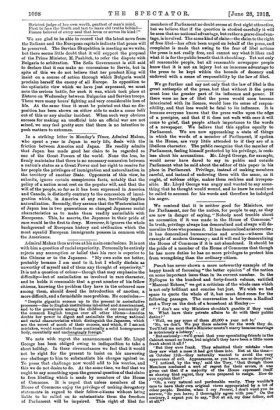We go further and say not only that the law
of libel is the great antiseptic of the press, but that without it the press must lose the greater part of its influence and power. If there were no law of libel the press would soon become intoxicated with its licence, would lose its sense of respon- sibility, and that loss would be fatal to its influence. It is because everyone knows that the press walks upon the edge of a precipice, and that if it does not walk with care it will come to grief, that people attach importance to the words of a newspaper. We believe that this applies equally to Parliament. We are now approaching a state of things in which the words of a member of Parliament, if spoken in the House, are very little attended to if they arc of a libelous character. The public recognize that the member of Parliament, feeling himself protected by his privilege, is reck- less about his accusations. Mr. Lloyd George, for example, would never have dared to say in public and outside Parliament what he said about the editor of this paper in his place in Parliament. Privilege, instead of making members careful, and instead of endowing them with the sense, as it ought, of noblesse oblige, makes them reckless and irrespon- sible. Mr. Lloyd George was angry and wanted to say some- thing that he thought would wound, and he knew he could not be called to account for his words and therefore he indulged his anger.


























































 Previous page
Previous page